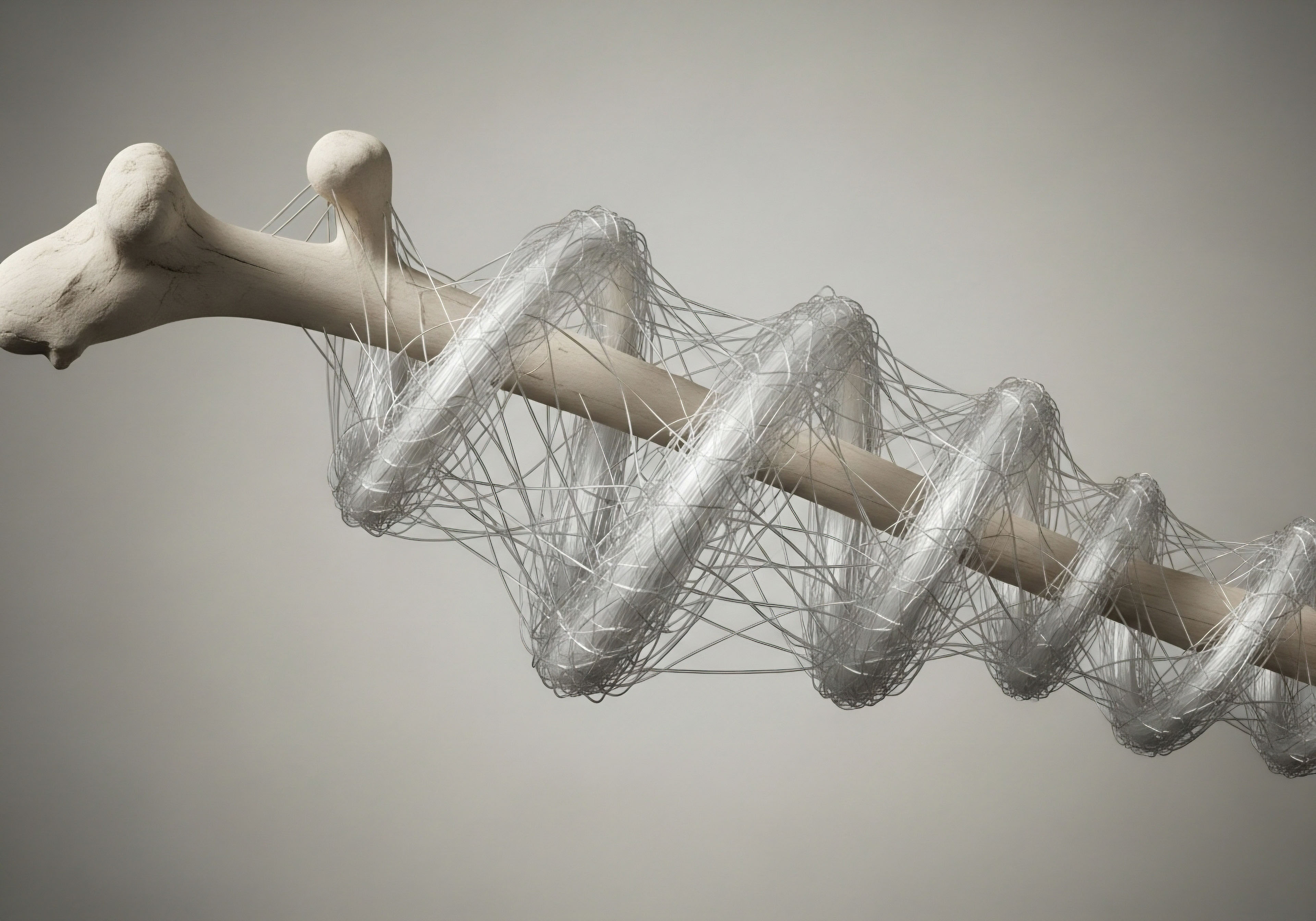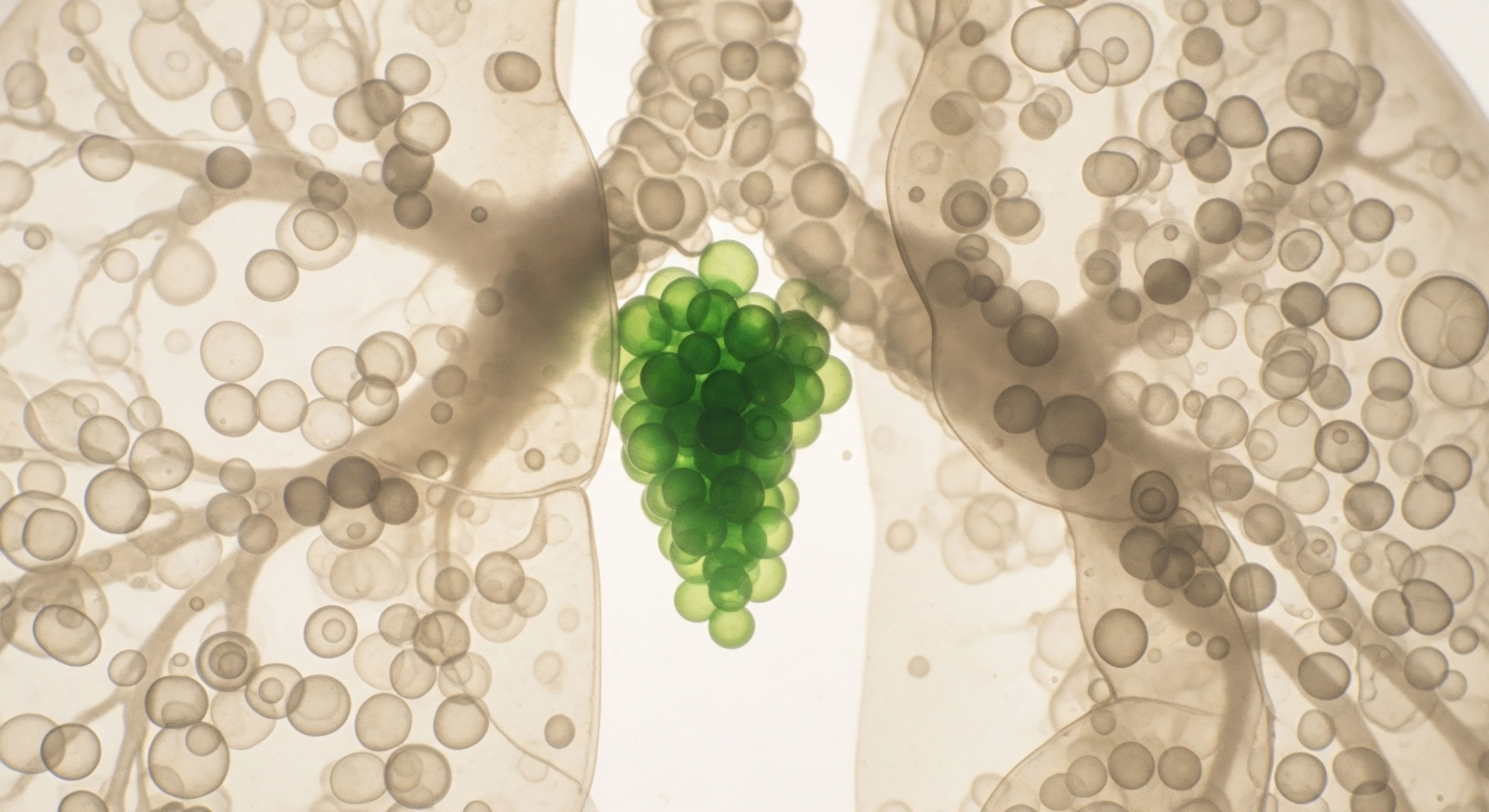

Fundamentals
Many individuals recognize a subtle, yet persistent, diminishment of their intrinsic vitality. Perhaps you have observed shifts in your energy levels, alterations in mood, or changes in your physical composition, prompting a contemplation of your body’s complex internal messaging system.
This experience often signals a deeper conversation occurring within your endocrine system, the intricate network of glands that orchestrate countless physiological processes. Understanding this dialogue becomes paramount for anyone considering or undergoing hormonal optimization protocols, as personal habits significantly shape the long-term efficacy of these interventions.
Your daily routines profoundly influence the subtle yet powerful operations of your body’s hormonal network.
Reclaiming robust health involves recognizing that your biological systems are not static entities; they respond dynamically to the stimuli of your daily existence. Hormonal therapy, while offering precise biochemical recalibration, thrives within an environment that supports its mechanisms. Lifestyle adjustments act as potent modulators, influencing how your body synthesizes, transports, and utilizes hormones, whether endogenously produced or therapeutically administered.
This journey toward enhanced well-being centers on creating an internal landscape where therapeutic efforts yield their most complete and enduring benefits.

Understanding Your Endocrine Orchestra
The endocrine system functions as a sophisticated orchestra, with various glands serving as instruments, each producing specific chemical messengers known as hormones. These hormones travel through the bloodstream, reaching target cells and tissues to elicit precise responses.
Consider the adrenal glands, which produce cortisol in response to stressors, or the gonads, responsible for testosterone and estrogen production, influencing everything from reproductive function to bone density and cognitive sharpness. The harmonious interplay among these glands ensures systemic equilibrium, guiding metabolic function, mood regulation, and physical adaptation.
Disruptions within this delicate balance often manifest as the symptoms many individuals experience, such as persistent fatigue, unexplained weight gain, or diminished cognitive clarity. Hormonal optimization protocols, such as testosterone replacement therapy (TRT) for men or women, directly address these imbalances by supplementing deficient hormones. However, the sustained success of these biochemical interventions hinges upon the supportive role of consistent lifestyle choices, which directly influence the body’s receptivity and adaptive capacity.

The Daily Symphony of Hormones
Your body’s hormonal rhythms are influenced by daily patterns, a concept often termed chronobiology. Cortisol, for instance, exhibits a diurnal rhythm, peaking in the morning to promote wakefulness and gradually declining throughout the day. Melatonin, conversely, rises in the evening to facilitate sleep. These natural oscillations are fundamental to maintaining energy levels, supporting restorative sleep, and regulating metabolic processes. When lifestyle factors disrupt these rhythms, the entire endocrine system experiences a cascading effect.
Consistently irregular sleep patterns, for example, can desynchronize cortisol release, leading to persistent states of elevated physiological stress. This desynchronization impacts insulin sensitivity, thyroid function, and the hypothalamic-pituitary-gonadal (HPG) axis, which governs sex hormone production. Recognizing these intrinsic rhythms provides a framework for understanding how seemingly minor daily choices collectively shape your hormonal milieu and, by extension, your overall health trajectory.

Why Lifestyle Matters for Hormonal Balance?
Lifestyle factors serve as critical determinants of hormonal health, influencing both the production and action of these vital chemical messengers. Nutrition provides the building blocks for hormone synthesis and modulates cellular signaling pathways. Regular physical activity enhances receptor sensitivity, allowing hormones to exert their effects more efficiently. Stress management techniques temper the adrenal response, preventing chronic cortisol elevation from disrupting other endocrine functions.
Moreover, the gut microbiome, often considered a separate system, significantly impacts hormone metabolism and detoxification. A balanced microbiome aids in the proper elimination of hormone metabolites, preventing their reabsorption and potential disruption. Consequently, integrating thoughtful lifestyle adjustments alongside hormonal therapy creates a synergistic effect, allowing the body to respond more robustly to treatment and maintain a state of sustained equilibrium.


Intermediate
For individuals already familiar with the foundational principles of hormonal physiology, the next step involves comprehending how lifestyle choices specifically interact with and amplify the effectiveness of prescribed hormonal optimization protocols. These adjustments transcend mere supportive measures; they are integral components that dictate the long-term success and safety profile of therapies such as Testosterone Replacement Therapy (TRT) for men and women, or various growth hormone peptide regimens.
A precise understanding of this interplay empowers individuals to become active participants in their health journey, optimizing their biological response to therapeutic interventions.
Lifestyle choices are active determinants, not passive accompaniments, to the success of hormonal therapies.
The administration of exogenous hormones or stimulatory peptides initiates a complex biological dialogue within the body. The quality of this dialogue ∞ its clarity, efficiency, and sustainability ∞ is profoundly influenced by the metabolic, inflammatory, and epigenetic landscape shaped by daily habits. Therefore, a clinically informed approach to hormonal health necessitates a deep consideration of how nutrition, physical activity, sleep architecture, and stress resilience modulate the pharmacodynamics and pharmacokinetics of these powerful agents.

Optimizing Hormonal Optimization Protocols
Hormonal optimization protocols, such as weekly intramuscular injections of Testosterone Cypionate for men, often combined with Gonadorelin to preserve endogenous production and Anastrozole to manage estrogen conversion, are meticulously designed. Similarly, women undergoing testosterone therapy typically receive subcutaneous injections of Testosterone Cypionate, often alongside Progesterone, depending on menopausal status. These protocols aim to restore physiological hormone levels. The sustained efficacy of these treatments, however, depends significantly on the individual’s lifestyle.
Consider the impact of body composition on TRT outcomes. Adipose tissue, particularly visceral fat, contains aromatase enzymes that convert testosterone into estrogen. Individuals with higher body fat percentages often require more careful management of estrogen levels, sometimes necessitating higher doses of Anastrozole. Lifestyle interventions that promote a healthy body composition, such as consistent resistance training and a balanced diet, directly reduce aromatase activity, thereby improving the therapeutic index of TRT and minimizing potential side effects.

Nutritional Epigenetics and Endocrine Support
Nutrition extends beyond caloric intake; it functions as a potent epigenetic modulator, influencing gene expression and cellular function. The macronutrient composition of the diet, for example, significantly impacts insulin sensitivity, a cornerstone of metabolic health that directly influences the HPG axis. Diets high in refined carbohydrates and sugars can lead to chronic insulin resistance, which compromises sex hormone-binding globulin (SHBG) levels and free testosterone availability.
Specific micronutrients and phytonutrients also play critical roles. Zinc, magnesium, and vitamin D are essential cofactors for hormone synthesis and receptor function. Omega-3 fatty acids reduce systemic inflammation, which can otherwise impair hormonal signaling. A nutrient-dense dietary approach supports optimal liver function, which is crucial for hormone metabolism and detoxification, ensuring that both endogenous and exogenous hormones are processed efficiently.
Here is a breakdown of key nutritional considerations for hormonal therapy support ∞
- Protein Intake ∞ Sufficient protein provides amino acids for peptide hormone synthesis and supports lean muscle mass, which is metabolically active.
- Healthy Fats ∞ Cholesterol, a precursor to steroid hormones, necessitates adequate intake of healthy fats. Omega-3s mitigate inflammation, enhancing cellular receptivity.
- Complex Carbohydrates ∞ Stable blood glucose levels prevent insulin spikes, which can disrupt hormonal equilibrium.
- Micronutrient Density ∞ Vitamins D, B, Zinc, Magnesium, and Selenium are vital cofactors for endocrine enzyme activity.
- Fiber-Rich Foods ∞ Support gut health and the elimination of hormone metabolites, preventing reabsorption.

The Kinetic Connection ∞ Exercise and Hormonal Responsiveness
Regular physical activity profoundly influences hormonal milieu and receptor sensitivity. Resistance training, in particular, stimulates growth hormone release and enhances insulin sensitivity, both of which are beneficial for individuals on TRT or growth hormone peptide therapy. Exercise also improves cardiovascular health, a critical consideration for long-term hormonal therapy outcomes.
Growth hormone peptide therapy, utilizing agents such as Sermorelin, Ipamorelin/CJC-1295, or Tesamorelin, aims to stimulate the body’s natural growth hormone production. The benefits, including improved body composition, enhanced recovery, and better sleep, are significantly augmented by consistent exercise. Physical activity creates a demand for tissue repair and growth, providing a physiological context for the peptides to exert their full effects.
This table illustrates the direct impact of various lifestyle elements on hormonal therapy outcomes ∞
| Lifestyle Element | Impact on Hormonal Therapy Outcomes | Mechanistic Explanation |
|---|---|---|
| Optimized Nutrition | Enhanced hormone synthesis, improved receptor sensitivity, reduced side effects | Provides precursors, modulates inflammatory pathways, supports detoxification |
| Regular Exercise | Increased receptor density, improved metabolic clearance, better body composition | Stimulates growth factors, reduces aromatase activity in adipose tissue, enhances insulin sensitivity |
| Adequate Sleep | Optimized diurnal hormone rhythms, reduced systemic stress | Supports growth hormone release, modulates cortisol patterns, improves HPG axis function |
| Stress Management | Reduced cortisol burden, preserved adrenal reserve | Mitigates HPA axis overactivity, prevents downstream suppression of sex hormones |

Sleep, Stress, and Systemic Harmony
Sleep architecture and stress resilience are often underestimated, yet they exert profound control over endocrine function. Chronic sleep deprivation disrupts the delicate balance of the HPG and HPA axes, leading to elevated cortisol and impaired sex hormone production. Even with exogenous hormone administration, poor sleep can blunt the therapeutic response, as cellular repair and metabolic regulation predominantly occur during restorative sleep phases.
Unmanaged psychological stress triggers a sustained fight-or-flight response, leading to chronic elevation of glucocorticoids. This physiological state can compete with sex hormones for receptor binding, diminishing their efficacy. Strategies such as mindfulness, meditation, and structured relaxation techniques are not merely adjuncts; they are fundamental to creating an internal environment conducive to optimal hormonal therapy outcomes. They support the body’s intrinsic capacity for self-regulation, allowing therapeutic agents to work within a more balanced and responsive system.


Academic
The intricate relationship between lifestyle interventions and long-term hormonal therapy outcomes demands an exploration grounded in systems biology, molecular endocrinology, and epigenetics. Moving beyond a simplistic input-output model, we must recognize lifestyle adjustments as dynamic epigenetic conductors, orchestrating gene expression, cellular signaling cascades, and receptor dynamics that profoundly influence the sustained efficacy and safety of exogenous hormonal agents.
This academic deep dive focuses on the precise mechanisms through which diet, exercise, sleep, and stress management sculpt the cellular and systemic milieu, thereby dictating the adaptive resilience of the endocrine system under therapeutic conditions.
Lifestyle acts as a powerful epigenetic conductor, shaping the cellular and systemic response to hormonal interventions.
The administration of bioidentical hormones or growth hormone-releasing peptides (GHRPs) initiates a complex molecular dialogue. The ultimate phenotypic expression of this dialogue ∞ the degree of symptomatic improvement, the stability of biochemical markers, and the minimization of adverse effects ∞ is not solely a function of dosage or compound choice.
It is, rather, a sophisticated interplay between the therapeutic agent and the individual’s unique biological context, a context meticulously sculpted by their lifestyle. This perspective necessitates a detailed examination of cross-axis communication and the molecular underpinnings of cellular responsiveness.

The Interconnectedness of Endocrine Axes
The human endocrine system operates as a highly integrated network, with the hypothalamic-pituitary-gonadal (HPG) axis and the hypothalamic-pituitary-adrenal (HPA) axis engaging in extensive cross-talk. Chronic activation of the HPA axis, often induced by psychological stress or sleep deprivation, leads to sustained glucocorticoid elevation.
Glucocorticoids can directly inhibit gonadotropin-releasing hormone (GnRH) pulsatility and pituitary luteinizing hormone (LH) secretion, thereby suppressing endogenous testosterone production. This phenomenon is particularly pertinent for men on TRT, where lifestyle-induced HPA axis dysregulation can complicate the management of endogenous testicular function, even with concomitant Gonadorelin administration.
Furthermore, metabolic dysregulation, such as insulin resistance, acts as a significant disruptor of inter-axis communication. Hyperinsulinemia can increase adrenal androgen production, alter hepatic SHBG synthesis, and directly influence ovarian and testicular steroidogenesis. This creates a complex environment where hormonal therapy must contend with systemic metabolic noise, underscoring the necessity of lifestyle interventions that restore metabolic synchronicity.
The long-term success of testosterone therapy in women, for instance, is often contingent upon addressing underlying insulin resistance, which directly influences androgen bioavailability and receptor sensitivity in target tissues.

Molecular Dialogues ∞ Lifestyle as an Epigenetic Conductor
Lifestyle factors exert their influence at the molecular level, modulating gene expression through epigenetic mechanisms such as DNA methylation, histone modification, and non-coding RNA regulation. Nutritional components, for example, serve as substrates for enzymatic reactions involved in epigenetic modifications. Folate and methionine, key methyl donors, are essential for DNA methylation patterns that can influence the expression of hormone receptor genes or enzymes involved in hormone metabolism.
Physical activity also acts as a potent epigenetic modulator. Exercise-induced muscle contractions release myokines, such as irisin and FGF21, which influence systemic metabolism and insulin sensitivity. These myokines can, in turn, modulate the expression of genes involved in androgen receptor signaling or estrogen metabolism in various tissues. The long-term benefits of growth hormone peptide therapy, which aims to stimulate endogenous growth hormone, are thus amplified by exercise-induced epigenetic changes that enhance tissue responsiveness and anabolic signaling pathways.
Consider the role of Pentadeca Arginate (PDA) for tissue repair and inflammation. Its efficacy is maximized when the cellular environment is primed for healing, a state fostered by adequate nutrition, reduced oxidative stress, and sufficient sleep. These lifestyle elements support the complex cascade of molecular events necessary for tissue regeneration, including cytokine modulation and growth factor signaling, thereby creating a permissive environment for PDA’s actions.

Metabolic Synchronicity and Hormonal Efficacy
The efficacy of hormonal therapy is inextricably linked to metabolic health. Adipose tissue, once considered merely a storage organ, functions as a highly active endocrine organ, producing adipokines such as leptin, adiponectin, and resistin. Dysregulated adipokine signaling, common in states of metabolic syndrome, can induce chronic low-grade inflammation, which impairs insulin signaling and cellular hormone receptivity. This inflammatory milieu can also accelerate the metabolic clearance of exogenous hormones, necessitating higher doses or compromising therapeutic stability.
The impact of the gut microbiome warrants particular attention. The “estrobolome,” a collection of gut bacteria, produces enzymes (e.g. beta-glucuronidase) that deconjugate estrogen metabolites, allowing their reabsorption and potentially elevating systemic estrogen levels. For men on TRT, a dysbiotic gut can exacerbate estrogenic side effects, necessitating more aggressive Anastrozole protocols. Conversely, a healthy, diverse microbiome, fostered by a fiber-rich diet, supports efficient hormone detoxification and maintains a balanced endocrine environment.
This table details specific lifestyle interventions and their molecular targets in hormonal therapy ∞
| Lifestyle Intervention | Molecular Target | Clinical Impact on Therapy |
|---|---|---|
| Low Glycemic Diet | Insulin receptor sensitivity, SHBG regulation | Optimizes free hormone levels, mitigates insulin resistance, reduces cardiovascular risk |
| High-Intensity Interval Training (HIIT) | Mitochondrial biogenesis, myokine release (e.g. irisin) | Enhances growth hormone pulsatility, improves body composition, boosts metabolic rate |
| Mindfulness Meditation | HPA axis regulation, glucocorticoid receptor sensitivity | Reduces chronic cortisol, improves mood, enhances overall well-being |
| Circadian Rhythm Alignment | Melatonin-cortisol rhythm, clock gene expression | Optimizes sleep quality, supports restorative processes, stabilizes diurnal hormone patterns |

Longitudinal Perspectives on Therapeutic Resilience
Long-term hormonal therapy necessitates a perspective that accounts for the dynamic adaptive capacity of biological systems. Lifestyle adjustments, when consistently applied, do not simply mitigate acute symptoms; they cultivate a state of therapeutic resilience, enabling the body to maintain optimal function over decades. This involves sustaining robust cellular repair mechanisms, preserving telomere length, and enhancing cellular autophagy, all of which are positively influenced by strategic nutrition, regular exercise, and effective stress mitigation.
For instance, the prophylactic use of PT-141 for sexual health or Enclomiphene to support LH and FSH levels post-TRT, yields superior, sustained results within a biological context characterized by low systemic inflammation and optimized vascular health. These conditions are directly modulated by consistent lifestyle choices. Ultimately, understanding and leveraging these deep biological connections empowers individuals to transcend symptomatic management, fostering a profound and enduring state of physiological vitality.

References
- Veldhuis, Johannes D. et al. “Amplitude and frequency of pulsatile GnRH secretion and LH pulsatility ∞ Impact of metabolic and inflammatory states.” Journal of Clinical Endocrinology & Metabolism, vol. 99, no. 11, 2014, pp. 4087-4096.
- Kraemer, William J. et al. “Endocrine responses to resistance exercise.” Sports Medicine, vol. 35, no. 4, 2005, pp. 339-361.
- Dufour, Sylvain, et al. “Mitochondrial dysfunction in muscle and liver of insulin-resistant offspring of type 2 diabetic parents.” New England Journal of Medicine, vol. 352, no. 11, 2005, pp. 1180-1188.
- Lane, Mary Anne, et al. “The role of the gut microbiome in estrogen metabolism and women’s health.” Journal of Clinical Endocrinology & Metabolism, vol. 104, no. 11, 2019, pp. 5313-5321.
- Leproult, Rachel, and Eve Van Cauter. “Role of sleep and sleep loss in hormonal regulation and metabolism.” Best Practice & Research Clinical Endocrinology & Metabolism, vol. 24, no. 5, 2010, pp. 731-741.
- Liu, Yanyan, et al. “Dietary patterns and testosterone levels in men ∞ a systematic review and meta-analysis.” Andrology, vol. 8, no. 5, 2020, pp. 1198-1207.
- Hackett, Geoffrey, et al. “Testosterone replacement therapy and cardiovascular risk in men.” Trends in Urology & Men’s Health, vol. 10, no. 1, 2019, pp. 14-19.
- Schwarz, Stephan, et al. “Epigenetic mechanisms of exercise-induced adaptations in skeletal muscle.” Molecular Metabolism, vol. 20, 2019, pp. 1-12.
- Cheung, Alex S. et al. “Growth hormone secretagogues in clinical practice.” Reviews in Endocrine and Metabolic Disorders, vol. 20, no. 1, 2019, pp. 111-122.

Reflection
The journey toward optimal hormonal health is deeply personal, an ongoing dialogue between your unique biology and the choices you make each day. The insights shared here represent a starting point, a framework for understanding the profound influence of lifestyle on your endocrine landscape.
Consider this knowledge an invitation to introspection, a prompt to evaluate how your daily habits either support or detract from your physiological equilibrium. Your path to reclaiming vitality and function is not a passive one; it necessitates active engagement, a willingness to understand and honor your body’s intrinsic wisdom. This understanding empowers you to partner with your biology, cultivating a state of enduring well-being that transcends mere symptom management.



